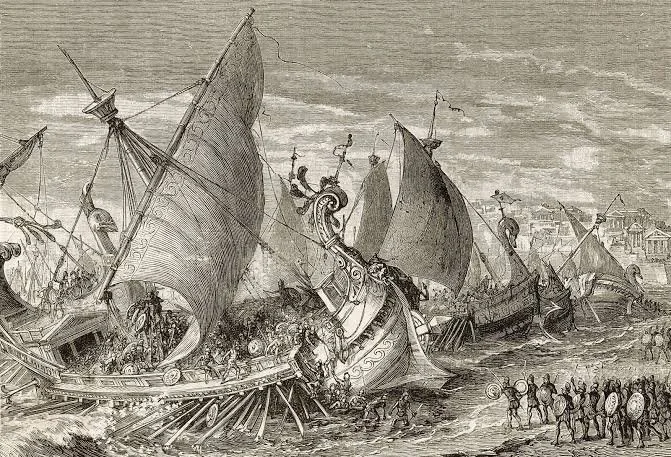Might = Right? Origins of Realpolitik
“The strong do what they can, and the weak suffer what they must.”
— Thucydides, History of the Peloponnesian War
If Plato asked how we should live, Thucydides asked how we actually do. And in that shift, from idealism to realism: political science was born.
Thucydides didn’t write myths or moral tales. He wrote history. Specifically, the story of the Peloponnesian War between Athens and Sparta, two great powers locked in a brutal, 27-year struggle for dominance. But what makes his work foundational is in the lens just as much as the details. He wasn’t explaining events through the will of the gods. He was showing how fear, self-interest, and raw power shape human affairs. This was politics, stripped of illusion.
Thucydides was the first to observe international conflict not as a matter of virtue or vice, but as a contest of interest. The Athenian leaders in his account don’t claim moral superiority. They assert that might makes right. Nowhere is this clearer than in the Melian Dialogue, where Athens confronts the neutral island of Melos. The Melians plead for justice. The Athenians respond bluntly: justice only exists between equals in power. Between unequals, the strong rule and the weak endure.
Thucydides was laying the groundwork for what we now call political realism—the idea that states act primarily in pursuit of their own survival, power, and advantage. Idealism, morality, diplomacy — all of these are tools, but none outweigh the hard logic of power.
Fast forward 2,400 years, and the patterns haven’t changed. Political scientists still reference Thucydides to explain major geopolitical tensions; especially one in particular: the rise of China and the response of the United States.
In 2017, Harvard political scientist Graham Allison coined the term “Thucydides Trap” to describe the recurring danger when a rising power threatens to displace an existing one. Just as Athens rose and unsettled the established dominance of Sparta - triggering a catastrophic war — China’s economic and military expansion has sparked anxiety in the U.S. led global order.
Whether it’s trade wars, military exercises in the South China Sea, or competition over AI and semiconductors, the logic remains: when one power grows rapidly, the dominant power feels threatened. That threat, whether rational or not, can turn competitive tension into open conflict.
This is the essence of Thucydidean insight. It’s not about what leaders say. It’s about what they fear. The real causes of war, Thucydides wrote, are “fear, honor, and interest.” Strip away the speeches, and those three drivers still define the headlines.
This isn’t just about great powers either. You see it in smaller conflicts, too. Wherever might determines terms. Where diplomacy is a performance, and the real negotiation happens through leverage. Where alliances shift not out of loyalty, but out of shared threat. It’s in Ukraine. It’s in Taiwan. It’s in the scramble for influence across Africa and the Arctic.
But Thucydides wasn’t only offering a theory of war. He was offering a way of seeing. A way of studying politics that was grounded in evidence, not ideals. He paid attention to speeches, troop movements, alliances, strategies. He analyzed how ambition and fear ripple through decisions. He showed how history could be a method.
In that sense, The History of the Peloponnesian War isn’t just a chronicle of the past. It’s a blueprint for how to think politically. It’s the reason some argue political science does not begin with Plato’s vision of a perfect republic, but with Thucydides’ cold, clear-eyed look at how power actually works.
So much of modern political thought has roots in this. The idea of balance of power, the study of realpolitik, the warnings about entangling alliances; all trace back to this Athenian general turned historian, writing in exile, trying to make sense of a war his city could not win.
And maybe that’s the deeper lesson.
Despite Thucydides’ cold, clear-eyed look at how power actually works, he also tells the story of a civilization that collapsed under the weight of that thinking. Athens, brilliant and ambitious, came to believe too much in its own might. It pursued dominance at the cost of stability, expansion at the cost of restraint. The logic of power, when left unchecked leads not to glory, but ruin. The end of the Peloponnesian Wars was the beginning of the end of Ancient Greece’s Golden Age.
In other words, realism may explain why states act the way they do. But history shows what happens when that mindset becomes a blueprint instead of a warning. Acting out of fear, honor, and interest might be natural. But it’s also the path so many powers have taken just before they fall.
We still live in a world shaped by fear and force. But if we can understand the dynamics…. see them clearly…. we’re not doomed to repeat them blindly.
Power still matters.
But so does perspective.









